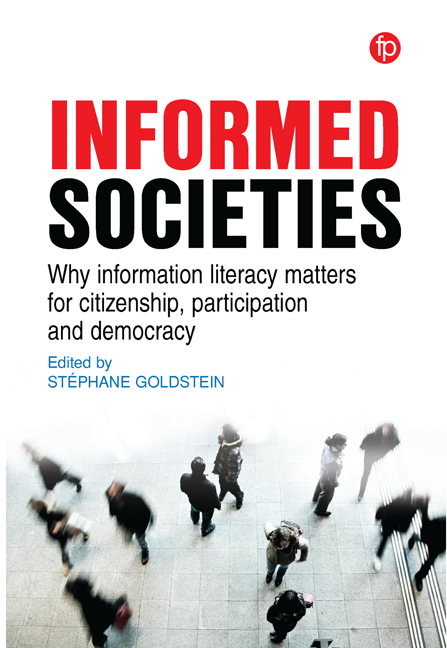Book contents
- Frontmatter
- Contents
- Figures and Tables
- Notes on the authors
- Foreword
- Introduction
- 1 Information Literacy in the Digital Age: Why Critical Digital Literacy Matters for Democracy
- 2 The Discourses of Power, Information and Literacy
- 3 What Intellectual Empathy Can Offer Information Literacy Education
- 4 The ‘Post-Truth’ World, Misinformation, and Information Literacy: a Perspective From Cognitive Science
- 5 Media and Information Literacy: Intersection and Evolution, a Brief History
- 6 Information Literacy and National Policy Making
- 7 Information Literacy as a Growth Pillar for a Fledgling Democracy
- 8 Information literacy and the Societal Imperative of Information Discernment
- 9 Libraries and Democracy: Complementarity in a Regime of Truth
- 10 Scottish Public Libraries Welcome Syrian New Scots: a Transition from Being a Refugee to Becoming an Active Part of the Community
- 11 Information Literacy, Lifelong Learning and the Needs of an Ageing Population
- Index
11 - Information Literacy, Lifelong Learning and the Needs of an Ageing Population
Published online by Cambridge University Press: 22 February 2020
- Frontmatter
- Contents
- Figures and Tables
- Notes on the authors
- Foreword
- Introduction
- 1 Information Literacy in the Digital Age: Why Critical Digital Literacy Matters for Democracy
- 2 The Discourses of Power, Information and Literacy
- 3 What Intellectual Empathy Can Offer Information Literacy Education
- 4 The ‘Post-Truth’ World, Misinformation, and Information Literacy: a Perspective From Cognitive Science
- 5 Media and Information Literacy: Intersection and Evolution, a Brief History
- 6 Information Literacy and National Policy Making
- 7 Information Literacy as a Growth Pillar for a Fledgling Democracy
- 8 Information literacy and the Societal Imperative of Information Discernment
- 9 Libraries and Democracy: Complementarity in a Regime of Truth
- 10 Scottish Public Libraries Welcome Syrian New Scots: a Transition from Being a Refugee to Becoming an Active Part of the Community
- 11 Information Literacy, Lifelong Learning and the Needs of an Ageing Population
- Index
Summary
Introduction: the ageing population – a contested demographic
This chapter will focus on the civic possibilities of information literacy in relation to the needs and issues of an ageing population. This is a global question and it will be addressed from that perspective, but also using insights from: (i) the author's experience in Scotland's civic spaces – principally influencing government and political parties through Third Sector activism; and (ii) his interest in lifelong learning strategies as a useful conceptual lens – particularly those derived from the work of Paulo Freire.
The UK population has undergone a fundamental demographic shift in age structure, including falling birth rates, longer life expectancy and increase in the average age (HM Government Office for Science, 2016), which will require substantial changes across most areas of civic life, democracy and politics. In effect we are living in a society where the majority of people are in older age groups and this trend is set to continue. Significant change in age structures is a global experience shared with other nations and regions (Zimmer and McDaniel, 2013; UN Department of Economic and Social Affairs, 2017). Clearly forecasting population change is fundamental to anticipating and making the various provisions required to adapt to change and maintain society.
In response, key concepts about the age structure of society like ‘old age’, ‘retirement’ and ‘state pension age’ are being systematically reframed in a public narrative, shaped by a dominant neoliberal political economy, as entailing unsustainable pension costs with equally unsustainable associated health and care costs (Macnicol, 2015). This narrow framing is contradicted by an alternative view of such socio-cultural features which views retirement and pension costs as essential features of the lifecourse, to be managed constructively by developed nations in order to sustain themselves as cohesive civic spaces.
Concepts like retirement, the state pension and the nature of social care arrangements have implications for everybody in society and are therefore important practical aspects to consider whenever demographic ageing is discussed as a public policy issue (Harper, 2016). Of equal importance is the challenge of linking demographic ageing to other macro-level global dynamics such as climate change, technological change and the economic environment, which are currently treated as separate issues (British-Irish Council, 2016; Lawrence, 2016).
- Type
- Chapter
- Information
- Informed SocietiesWhy information literacy matters for citizenship, participation and democracy, pp. 207 - 228Publisher: FacetPrint publication year: 2019



